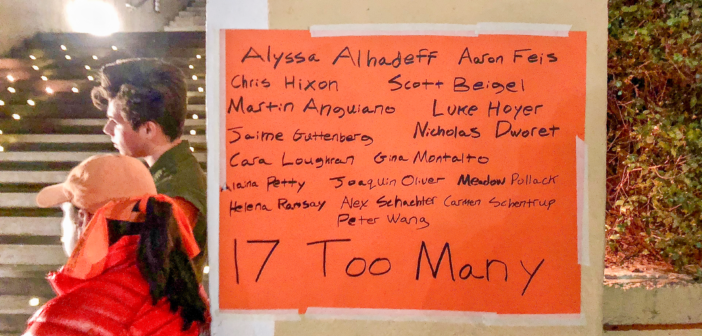Alan Davis, ’01G, huddled behind a flipped-over table with the lights out on a sunny, warm June day.
Davis was one of about 20 school district administrators seeking refuge in a first-floor classroom at Nazareth Area High School.
Enter: A man with an airsoft gun screaming and yelling, “Where is the principal? Where is the principal?”
Davis, the Nazareth Area High School principal, kept his eyes closed. He avoided eye contact. He remained quiet.
“You could hear his footsteps,” Davis said. “It was so eerie because it was so quiet — everyone was trying to be silent, and we were hiding on the far side of the room.”
All of a sudden, airsoft pellets flew through the air. Davis was shot.
He was a player in a simulation scenario for the ALICE active shooter civilian response program. The man entering the room with the airsoft gun was an ALICE trainer executing the shooter simulation.
“You know it’s fake, but in the moment it feels real,” Davis said.
ALICE, which stands for Alert, Lockdown, Inform, Counter, Evacuate, was adopted by the high school in early 2017. Administrators received training during the summer, and strategies were taught to faculty, staff and students in November 2017 .
School districts across the Lehigh Valley continue to prepare students with the proper procedures for active shooter situations.
While each school district in the Lehigh Valley has different active shooter protocols, Nazareth Area High School chose ALICE over the traditional lockdown-only approach for its flexible tactics and protocols.
“The way I view ALICE is that it gives you options when you are in a crisis situation,” Davis said. “If you look at some of the footage from Florida or other incidents, you see some of the ALICE concepts being used.”
Kacy Clowser, an eagle block coordinator and gifted case manager for the high school, said students trained under ALICE told her they feel more empowered about having options and taking safety into their own hands.
“With ALICE you can stay, you can leave the room, you can go out the window,” Clowser said. “It provides options based on the comfort levels of the teachers and students — kind of like your instinct. The skills we learned in the training also can be used outside the school environment — in the grocery store, at the movies — they are concepts that could be applied outside of the school setting.”
Since implementing ALICE, Davis has teachers devote a portion of one class period each month to practice a school-wide scenario. He said with the range of options, each classroom has the ability to respond to an intruder differently.
In the Bethlehem Area School District, Superintendent Joseph Roy, ’09G, has implemented the “Locks, Lights, Out of Sight” procedure if an active shooter enters any Bethlehem school.
“Certainly, tragedy puts a lot of scars on a community in a lot of different ways,” Roy said. “It’s hard for people to feel a sense of safety and trust.”
Roy said he is understanding of and sensitive to the active shooter topic. He said that on Dec. 12, 2006, when he was principal at Springfield Township High School, a student came into the school with an assault rifle and shot five rounds at the hallway walls. A few minutes later, the student took his own life.
At the time, Roy’s oldest daughter was in the hallway and heard the sounds of gunshots. She ducked into the nearest classroom for safety. He said his daughter, now 26, calls him every Dec. 12 in remembrance of how this incident impacted their community.
Today, as superintendent, Roy encourages Bethlehem principals to continue to implement practice shooter protocols. For example, Roy said doors should not be propped open and that secretaries should monitor the cameras and visitors who are entering the building.
“I think you have to pay attention to physical security, make sure camera systems are working properly, but then you also have to create a positive culture in the school,” he said.
While Roy said he likes the current active shooter protocol, in the future the district is considering adding an evacuation route.
In the Allentown School District, superintendent Thomas Parker’s long-term district goal is to cultivate a community where students who do not feel safe are comfortable expressing their feelings to a trusted teacher or mentor.
Parker hopes to educate the community more about mental health and increase awareness about mental health services offered at the schools.
Melissa Reese, the communications manager for Allentown School District, said each Allentown school has a safety plan specified by the principal on active shooter procedures. Each teacher is provided with a copy of the emergency manual.
Reese said the Allentown School District is encouraging students to say something if they see something. She said she has noticed a shift in perception in students taking lockdown drills seriously
But the conversation doesn’t stop at the school district level. Rep. Charlie Dent, ’93G, of the 15th Congressional District, has become involved in finding solutions to prevent gun violence.
“Congress must come together to find solutions that keep our students, teachers and schools safe from gun violence,” Dent wrote in an email. “I joined Rep. Brian Fitzpatrick, a fellow Pennsylvanian, to support common sense policy that would raise the legal age to purchase semiautomatic rifles with a capacity of five or more rounds from 18 to 21 years old. Additionally, I am a co-sponsor of the Thompson-King background check bill (the House version of Toomey-Manchin), which would expand background checks for private sales of firearms, including transfers conducted online and at gun shows.”
He supports expanding background checks for private sales of firearms and co-sponsored legislation to ban the sale of bump stocks, which convert semi-automatic weapons into automatic weapons. He also supports preventing sales to individuals on the No Fly List and is reviewing the “red flag” laws.
All three school districts have held discussions with students about strategies to cultivate safer school environments.
“It’s definitely not just a Lehigh Valley issue,” Reese said. “It really is a national issue that everyone needs to look at. We are doing everything we can to evaluate and make sure all of our safety protocols are in place in case of an emergency, but we also need to engage and empower our community to keep each other safe.”






Comment policy
Comments posted to The Brown and White website are reviewed by a moderator before being approved. Incendiary speech or harassing language, including comments targeted at individuals, may be deemed unacceptable and not published. Spam and other soliciting will also be declined.
The Brown and White also reserves the right to not publish entirely anonymous comments.